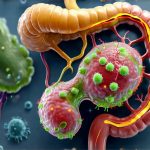Diarrhea, a common yet often disruptive gastrointestinal issue, affects people of all ages. While frequently dismissed as a temporary inconvenience caused by food poisoning or a viral infection, chronic or recurrent diarrhea can signal deeper underlying issues within the digestive system. Increasingly, research points to a significant connection between gut inflammation and diarrheal symptoms. The gut, far from being simply a processing center for food, is now recognized as an incredibly complex ecosystem with profound influence on overall health – including immune function, mental wellbeing, and even chronic disease risk. Understanding how inflammation within this system can lead to diarrhea is crucial for both prevention and effective management of these bothersome symptoms.
The gut microbiome—the trillions of bacteria, fungi, viruses, and other microorganisms residing in our digestive tract—plays a pivotal role in maintaining gut health. When this delicate balance is disrupted – by factors like diet, stress, antibiotics, or immune dysfunction – it can trigger an inflammatory response. This isn’t always negative; acute inflammation is a normal part of the body’s defense mechanism. However, chronic gut inflammation, where the inflammatory state persists over time, can damage the intestinal lining, impair nutrient absorption, and ultimately manifest as diarrhea alongside other digestive complaints like bloating, abdominal pain, and altered bowel habits. The relationship isn’t always straightforward; it’s a complex interplay between microbial imbalances, immune responses, and the integrity of the gut barrier. Recognizing that gut inflammation can be linked to issues beyond just digestion is key, and understanding the link between gut inflammation and trapped gas can offer valuable insight.
Understanding Gut Inflammation
Gut inflammation is not a single disease but rather a feature of many different conditions. It represents an overactivation of the immune system within the gastrointestinal tract. This can be triggered by a variety of factors. – Dietary choices high in processed foods, sugar, and unhealthy fats contribute to systemic inflammation that extends to the gut. – Infections from bacteria (like E. coli or Salmonella) or viruses can directly inflame the intestinal lining. – Autoimmune diseases such as Crohn’s disease and ulcerative colitis are characterized by chronic inflammation driven by the body attacking its own tissues. – Even stress, a significant factor in modern life, can impact gut health through the gut-brain axis, influencing inflammatory processes.
The consequences of persistent gut inflammation extend beyond diarrhea. A compromised intestinal barrier – often referred to as “leaky gut” – allows undigested food particles, bacteria, and toxins to enter the bloodstream, potentially triggering systemic immune responses and contributing to a wide range of health problems. This can impact everything from joint pain and skin conditions to fatigue and mood disorders. Furthermore, chronic inflammation disrupts normal digestive function, leading to malabsorption of essential nutrients and exacerbating symptoms like bloating and gas. It’s important to remember that the gut isn’t isolated; it’s intrinsically linked to overall health. Consider how gut pain and emotional triggers can exacerbate these issues.
The body attempts to regulate this inflammatory process but when it becomes dysregulated, interventions are often necessary. Identifying the root cause is paramount for effective management. This might involve dietary changes, stress reduction techniques, or addressing underlying medical conditions. It’s also important to support the gut microbiome through strategies like consuming probiotic-rich foods or considering a probiotic supplement (under healthcare professional guidance). For some, frequent burping and digestive inflammation may be an early sign of deeper issues.
Diarrhea: Mechanisms & Types
Diarrhea is defined as having three or more loose or watery stools in a 24-hour period. This seemingly simple symptom can arise from diverse mechanisms. – Osmotic diarrhea occurs when there’s an excess of undigested solutes in the intestine, drawing water into the bowel and causing increased stool volume. Lactose intolerance is a classic example. – Secretory diarrhea involves excessive fluid secretion by the intestinal lining, often due to bacterial toxins or inflammatory processes. Certain infections or hormonal imbalances can cause this type. – Motility-related diarrhea happens when food moves too quickly through the digestive tract, not allowing enough time for water absorption. This can be triggered by stress, anxiety, or certain medications. – Inflammatory diarrhea is directly linked to gut inflammation; the inflamed intestinal lining loses its ability to properly absorb fluids and may also secrete inflammatory substances contributing to watery stools.
Chronic diarrhea, lasting four weeks or longer, often indicates a more serious underlying problem than acute diarrhea. Identifying the type of diarrhea – osmotic, secretory, motility-related, or inflammatory – is crucial for determining the appropriate course of action. Diagnostic tests like stool analysis can help pinpoint the cause and guide treatment strategies. It’s also vital to rule out other medical conditions that might mimic diarrheal symptoms. Understanding how menstrual cycle phases and gut sensitivity can play a role is important for women experiencing chronic issues.
The Role of the Microbiome in Inflammation & Diarrhea
The gut microbiome is a critical player in both triggering and mitigating gut inflammation. A dysbiotic microbiome – one with an imbalance between beneficial and harmful bacteria – can contribute significantly to inflammatory processes. Harmful bacteria produce toxins that irritate the intestinal lining, while a lack of beneficial bacteria reduces the production of short-chain fatty acids (SCFAs) like butyrate, which have anti-inflammatory properties and support gut barrier integrity. This weakened barrier allows for increased permeability (“leaky gut”), further exacerbating inflammation.
Restoring microbial balance is therefore often a key component of managing both gut inflammation and diarrhea. Strategies to achieve this include: 1. Consuming a diet rich in fiber, prebiotics (food for beneficial bacteria), and probiotics (live beneficial bacteria). Fermented foods like yogurt, kefir, sauerkraut, and kimchi are excellent sources of probiotics. 2. Limiting intake of processed foods, sugar, and unhealthy fats that promote inflammation and disrupt microbial balance. 3. Avoiding unnecessary antibiotic use, as antibiotics can indiscriminately kill both harmful and beneficial bacteria. If antibiotics are necessary, consider supplementing with a probiotic afterward to help restore the microbiome. When considering lifestyle factors, overtraining and gut inflammation should be considered as well.
Dietary Approaches for Reducing Gut Inflammation & Diarrhea
Diet plays an enormous role in modulating gut health and influencing inflammation levels. An anti-inflammatory diet focuses on whole, unprocessed foods that nourish the gut microbiome and minimize inflammatory triggers. – Emphasize fruits and vegetables rich in antioxidants and fiber. Berries, leafy greens, and cruciferous vegetables are particularly beneficial. – Incorporate healthy fats from sources like avocados, olive oil, nuts, and seeds. These fats support cell function and reduce inflammation. – Choose lean protein sources such as fish, poultry, beans, and lentils. Limit red meat consumption. – Stay hydrated by drinking plenty of water throughout the day. Water helps maintain stool consistency and supports digestive function.
For individuals experiencing diarrhea, certain foods may exacerbate symptoms and should be temporarily avoided. These include: – Dairy products (especially if lactose intolerant) – High-fat foods – Spicy foods – Caffeine and alcohol – Artificial sweeteners – Foods that cause gas and bloating (e.g., beans, broccoli, carbonated beverages). The BRAT diet (bananas, rice, applesauce, toast) is often recommended for acute diarrhea as these foods are gentle on the digestive system but shouldn’t be followed long-term due to limited nutritional value. Ultimately, identifying individual food sensitivities and intolerances through elimination diets or testing can further refine dietary strategies for managing gut inflammation and diarrhea. It’s essential to work with a healthcare professional or registered dietitian to develop a personalized dietary plan that addresses specific needs and conditions. Be mindful of gut pain and additives in food products, too. Finally, remember that perfectionism and gut reactions can contribute to stress and ultimately impact digestive health.


















